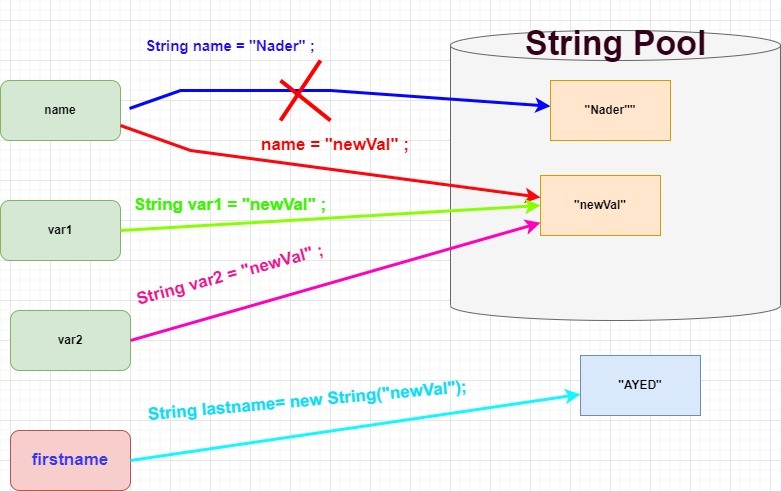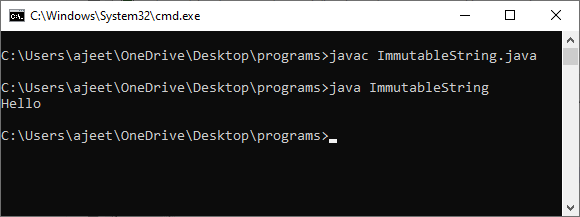Why Are Strings Immutable in Java? Insights right into Memory Efficiency
Why Are Strings Immutable in Java? Insights right into Memory Efficiency
Blog Article
Exploring the Advantages of Unalterable Strings in Modern Programs Paradigms
In the world of contemporary shows standards, the idea of immutable strings stands as a foundation of robust software growth. The advantages they offer go past mere ease; they essentially alter the means data is dealt with within applications. By embracing unalterable strings, programmers can guarantee improved information integrity, boosted thread safety and security, simplified debugging processes, increased protection actions, and reliable efficiency optimization. These benefits offer as a testimony to the profound effect that accepting immutability can have on the reliability and efficiency of software application systems.
Improved Information Integrity

By avoiding the alteration of string objects, immutability removes the threat of unintended changes to the data they hold. This not just improves the safety of the information however likewise improves the reliability of the code that relies upon these strings.
Immutability also supports more secure multithreading settings, as simultaneous access to immutable strings does not posture the risk of information corruption via synchronised adjustments. This property simplifies the procedure of dealing with strings in identical programs circumstances.
In essence, immutability serves as a safety shield around the information kept within strings, boosting their stability by making sure that as soon as defined, their worths continue to be the same throughout the program's implementation.

Boosted String Security
Immutable strings improve the string security of programs by guaranteeing that as soon as a string things is created, its value can not be changed. This home eliminates the risk of simultaneous strings trying to change the same string simultaneously, which can bring about data corruption or irregular states in the program - Why are strings immutable in Java?. In a multi-threaded atmosphere, where multiple strings accessibility and adjust data concurrently, the immutability of strings gives a level of safety and security by assuring that the data continues to be the same throughout its lifecycle
Streamlined Debugging Processes
Provided the improved thread security facilitated by unalterable strings, a substantial benefit occurs in the realm of streamlined debugging procedures. Immutable strings, when produced, can not be altered, making it much easier to trace the circulation of information and identify the resource of pests in a program. This immutability makes sure that strings remain regular throughout the execution of the program, decreasing the likelihood of unforeseen adjustments that might lead to mistakes.
When debugging with mutable strings, programmers frequently encounter issues where a string's worth is customized accidentally, making it challenging to pinpoint the source of a pest. However, with immutable strings, the information remains unmodified, allowing developers to concentrate on assessing the actual logic of the code instead of locating where and when a string was changed inaccurately.
Furthermore, immutable strings simplify the debugging procedure by making it possible for much easier reproduction of bugs. Because immutable strings do not transform state, designers wikipedia reference can recreate and examine bugs better, bring about quicker identification and resolution of problems within the codebase. This structured debugging workflow ultimately adds to higher software program high quality and boosted general growth effectiveness.

Enhanced Protection Steps
Enhancing data protection and fortifying system honesty, the utilization of immutable strings in software applications contributes significantly to boosted protection steps. Unalterable strings likewise play an important role in stopping usual safety and security susceptabilities such as barrier overflows and SQL injection assaults, as attempts to manipulate string information at runtime are inherently limited.
Additionally, the immutability of strings enhances the predictability of program behavior, making it easier to verify inputs and stop unforeseen adjustments that could endanger security. This predictability simplifies the procedure of auditing and validating code, allowing programmers to identify potential safety and security loopholes better. Generally, integrating immutable strings right into software program growth practices not just boosts the robustness and integrity of applications however also reinforces their resilience versus safety dangers.
Reliable Efficiency Optimization
Building upon the foundation of raised safety and security steps accomplished via the use of unalterable strings, a vital facet to take into consideration in software advancement is efficient efficiency optimization. When managing mutable strings, operations like concatenation or substring creation frequently result in the production of brand-new string objects, resulting in memory expenses and raised handling time. Nonetheless, with unalterable strings, these procedures can be optimized to enhance efficiency. By enabling strings to remain continuous and stable, unalterable strings assist in better memory management and caching chances, eventually boosting the overall efficiency of the software application.
Immutable strings likewise play a vital duty in multithreaded atmospheres by promoting thread security. Why are strings immutable in Java?. Since unalterable strings can not be customized when produced, they can be shared throughout strings without the danger of unexpected changes, minimizing the requirement for synchronization systems and enhancing concurrency. Additionally, immutable strings streamline debugging procedures as designers can rely on that a string's worth will certainly stay constant throughout the program's execution, removing prospective errors created by mutable state changes. Check Out Your URL To conclude, the use of unalterable strings not only boosts safety yet likewise significantly adds to the efficient performance optimization of modern-day software application systems.
Verdict
To conclude, the advantages of utilizing immutable strings in modern shows paradigms can not be overemphasized. Improved data integrity, improved string safety, streamlined debugging procedures, boosted protection procedures, and efficient performance optimization all contribute to the overall efficiency of shows tasks. By incorporating unalterable strings into shows techniques, developers can take advantage of a much more robust and view website dependable codebase.
Immutability, a vital attribute of strings in programs languages such as Java and Python, makes certain that when a string things is created, it can not be altered or changed.Unalterable strings enhance the string safety of programs by ensuring that as soon as a string things is produced, its value can not be modified. Immutable strings likewise play a crucial duty in avoiding usual safety vulnerabilities such as buffer overflows and SQL shot assaults, as attempts to adjust string information at runtime are inherently restricted.
By enabling strings to stay unchangeable and continuous, immutable strings assist in better memory management and caching opportunities, eventually enhancing the general effectiveness of the software program.
Unalterable strings simplify debugging processes as programmers can rely on that a string's value will continue to be regular throughout the program's execution, getting rid of possible mistakes caused by mutable state modifications.
Report this page